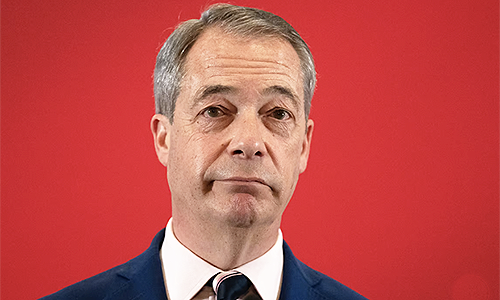
by PAUL COLLITS – THERE are two obvious losers from this week’s UK General Election.
The Tories, obviously. But they were not “wiped out”, as it was predicted. And the people of Britain, less obviously.
- This British version of democracy, as it is currently constituted, never gets it right.
- This voting system is both bent and broken.
- It is far preferable to have representative democracy than stable democracy.
The legacy media will report a huge victory for Labour and a catastrophic loss for the generally reviled Tories. Even conservatives now hate them.
Their demise is at least one thing that the majority of Brits will agree on. That is about all they will agree on.
REJOICING
The media will use words like “landslide”, “wipeout” and “historic”. There will be much rejoicing on the Left, still licking its wounds after very different, recent outcomes across European elections.
The wonders of the electoral system employed in the home of democracy mean two things. Majority rule is dead. And the majority won’t be happy.
These are the innate joys of the first-past-the-post (FPP) voting system in Britain.
The Brits only get to vote every five years, in theory, so it is important they get it right.
Look at the seats on versus percentage of the national vote gained and you begin to get the picture. These are rough, early figures gleaned from some of the initial, evolving reportage.
The Liberal Democrats garnered 12 per cent of the votes and may get 50 plus seats in the House of Commons. Reform UK received 15 per cent of the vote and are likely to win four seats. What?
The Tories obtained around 24 per cent of the vote and are heading for 150 seats or so. Reform UK may well feel diddled.
So, seats won does not remotely reflect the wishes of the people.
Then there is the “landslide” for Labour narrative – with only 35 per cent of the vote.
So, 65 per cent of the voters don’t want them. But it is worse than that, given voluntary voting and a 60 per cent turnout.
As UK author Iain Davis notes: “Of course the largest single group of voters didn’t elect any government at all. With 60 per cent general election turnout, Labour’s paltry 34 per cent of the vote was resoundingly trounced by the 40 per cent of the electorate who couldn’t be arsed to vote for anyone.
“Which means, in effect: Well, here in the UK we have a new Trilaterist – er, sorry, I meant Labour Government, led by the charismatic Keir Starmer. Likened to a dish rag, and not without good reason, Keir Starmer now commands the government with a whopping 170+ seat majority after nearly 80 per cent of the British electorate didn’t vote for either him or the Labour Party.
Let’s hope no one uses the word “mandate”. The Tory vote collapsed, certainly.
But Labour’s vote hardly went up at all (about 4 per cent). We already knew that the Tories were, correctly, loathed by many.
Between them, the legacy Parties, whose major difference is the speed at which they are driving the mother country over the cliff, scraped together 59 per cent of the vote.
In other words, more than 40 per cent of voters have rejected both major Parties. At least the two branches of the Australian UniParty achieved 60 per cent plus in 2022.
Looking at it another way, Reform UK and the Tories – the notionally Right-of-centre Parties – received comfortably more votes than Labour.
BROKEN
Yet Labour will secure more than 400 seats (you need 326 to form a government) and Reform plus the Conservatives are likely to hold around 160 seats. This doesn’t seems quite right.
This system is both bent and broken. Not a bad feat of physics, right there.
To those who say, well, every electoral system is flawed (it is) and at least FPP voting delivers “stable” government (it does, in theory), I say that stable government is overrated if it is corrupt, undemocratic, illiberal, cronyist and tending towards tyranny at the drop of a virus.
These days, it is far preferable to have representative democracy than stable democracy.
It is simultaneously both reassuring and chilling that this perverse electoral outcome won’t matter a jot in the overall scheme of things, notwithstanding the earnestly held positions of those who, like UK author Peter Hitchens, think that Labour will be a revolutionary disaster and that a Tory Government was to have been preferred.
Those who believe that political actions (like voting) don’t make any difference to the world in today’s Western democracies will be rolling their eyes at all the fuss over the election result.
Geneva-based institutions like the World Health Organisation and the World Economic Forum, and their controligarch corporate backers, will continue to pull the strings, irrespective of the result of this election or of any other.
Still, you would like to think that electoral outcomes in liberal democracies roughly reflect the voting intentions of their people. And it is still gut-wrenching when they, patently, do not.
Oh, and one piece of good news. Penny Mordaunt, Tory progenitor of the recent MPs guide to conspiracy theories, lost her seat.
WRONG
Her take: “To anyone who is disappointed, democracy is never wrong,” she said in her concession.
What a platitudinous idiot. If the above analysis is remotely correct, it seems that the British version of democracy, as it is currently constituted, is never right.
As for Sir Keir Starmer.
The new PM’s take is equally mendacious and (of course) self-serving: “Presumptive Prime Minister Keir Starmer says the British people ‘have spoken and they are ready for change’.”
Well, he would say that.
On these occasions, legacy politicians say the darndest things. Well, 35 per cent might be “ready for change”.
The other 65 per cent are merely confused. And change? How about simply more of the same, only worse.
The British people may have spoken, but what they have said, and what they really want, is not entirely clear to this old political scientist.PC













Are you a political scientist, Paul? What is that, exactly? I might have guessed what you meant if you were a ‘climate scientist’ of the hysterical bent…
Thanks for the article. Certainly perverse results. We should allow Australians not to vote. Then we would not be forced to legitimise our mediocre and incompetent excuses for government.